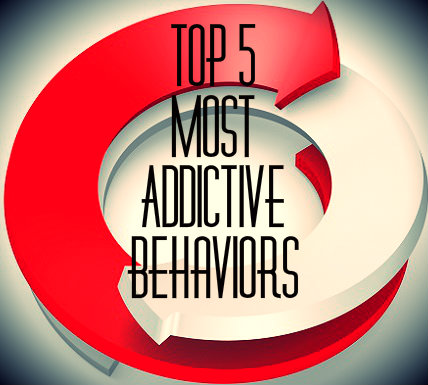Top 5 Most Addictive Behaviors
Drugs and alcohol are not the only things that can lead you down the path to a dangerous obsession and addiction. Behaviors can be addictive too. Experts call these behavioral or process addictions and they can be nearly as damaging as a drug addiction or alcoholism.
Most of us will not become obsessed with a behavior or activity to the point of addiction, but none of us are completely risk-free. Learn what the experts say are the most potentially addictive behaviors so that you can avoid getting hooked on them. While you need not avoid these activities entirely, you should be aware that they can lead to addictive behaviors.
Top Behavioral Addictions
Researcher Dr. Reef Karim, a specialist in behavioral addictions, reviewed studies to find which behaviors are the most addictive.
 Gambling – Gambling tops that list. Gambling disorder affects two percent of the population and is the only behavior that gets widespread support as a true behavioral addiction. Much research on problem gambling has been conducted and has found that gamblers experience a high when winning, similar to the experience of drug use. They also experience withdrawal when not gambling, including physical symptoms like headaches and insomnia.
Gambling – Gambling tops that list. Gambling disorder affects two percent of the population and is the only behavior that gets widespread support as a true behavioral addiction. Much research on problem gambling has been conducted and has found that gamblers experience a high when winning, similar to the experience of drug use. They also experience withdrawal when not gambling, including physical symptoms like headaches and insomnia.
- Internet And Gaming – This type of addictive behavior is a recent addition, but a powerful one. Most experts agree that Internet gaming disorder is a real problem for some people and one that is very similar to drug addiction. Much of the evidence for Internet addiction being a real disorder comes from Asia. Young men there in particular have become so obsessed with gaming that they stop eating and neglect all other responsibilities, including the care of children. This level of obsession is similar to what drug addicts experience.
- Sex Addiction – That sex can become addictive is not surprising. The experience activates the reward system in the brain, as do drugs and alcohol. While regular and frequent sex with one partner is not unhealthy, obsessive sexual activities are. Compulsively using pornography, looking for sex with strangers or engaging in exhibition are behaviors that are considered signs of an unhealthy obsession with sexual activities.
- Eating – Food also activates our reward centers, especially foods that are high in fat, sugar or salt. Eating disorders like bulimia and anorexia are dangerous and involve compulsive behaviors, but they are not addictive disorders. Compulsive overeating, on the other hand, shares characteristics with drug and alcohol addiction. Also known as binge eating, this behavior includes obsessing over food. Compulsive eaters tend to spend an unnatural amount of time thinking about food, planning meals, and frenzied eating to the point of getting sick. Between two and four percent of Americans may struggle with binge eating.
- Shopping – Compulsive shopping is controversial among experts. Some think it can be classified as a behavioral addiction, while others are on the fence. More research is needed to clarify, but it seems that buying something you really want activates the reward system in your brain. Developing this obsession is harmful because it can lead to serious financial problems.
There are a number of behaviors that can become obsessive, but these five are the most common. Just like a drug addiction, these behaviors can cause you to engage in them compulsively, ignore your responsibilities, develop withdrawal, experience highs and ultimately even ruin your life. Be aware of the possibility of behavioral addictions and look for signs of obsessions in yourself and those you love so you can get professional help if needed.
Read Our Other Behavioral Addictions Posts



